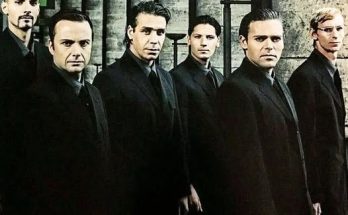When Imagine Dragons took the stage in Milan, Italy, on a crisp evening packed with energy, few could have predicted that the night would end in one of the band’s most politically charged moments to date. Frontman Dan Reynolds, known for his outspoken personality and humanitarian leanings, stunned both fans and critics alike when he raised a Palestinian flag high above his head mid-performance—an act that came just days after the band faced heated criticism for performing in Tel Aviv amid the ongoing conflict between Israel and Hamas. The image of Reynolds waving the flag under a cascade of lights instantly went viral, igniting a global debate that blurred the lines between art, activism, and accountability in a time of heightened geopolitical tension.
For Reynolds, this was more than a fleeting moment of showmanship. It was a statement—one that many saw as a direct response to the backlash surrounding the band’s controversial decision to perform in Israel. Imagine Dragons had previously insisted that their show in Tel Aviv was a gesture of inclusivity and unity, not politics. Yet, in the wake of the performance, fans and activists across social media accused them of insensitivity and complicity, arguing that playing in Israel while violence continued in Gaza was an endorsement, intentional or not, of the government’s actions. The Milan concert, therefore, became something of a public reckoning for Reynolds, a man torn between artistic neutrality and moral responsibility.
As the crowd of thousands cheered wildly that night, Reynolds’ gesture took on a life of its own. He didn’t say much—he didn’t have to. The sight of the Palestinian flag fluttering above the stage spoke louder than any lyrics. For some, it was a redemptive act of solidarity. For others, it was too little, too late—a performative move after succumbing to global criticism. The flag moment capped off an emotionally charged performance, one that oscillated between raw vulnerability and defiance. The tension was palpable: here was a global superstar standing in the middle of a cultural firestorm, refusing to stay silent.
In interviews leading up to the band’s European tour, Reynolds had hinted at feeling conflicted about the Tel Aviv show. While he had emphasized Imagine Dragons’ message of unity, love, and hope, critics noted that the band’s statements carefully avoided taking a stance on the humanitarian crisis unfolding in Gaza. The backlash was swift. Activists urged the group to cancel their Israeli performance, citing the cultural boycott movement that encourages artists to avoid playing in the country as long as the occupation persists. For many fans, especially those in the Middle East and Europe, the band’s insistence on going ahead with the concert felt tone-deaf. The global social media climate, already polarized and emotionally charged, erupted with hashtags calling for accountability.
When Imagine Dragons finally took the stage in Tel Aviv, Reynolds appeared eager to defuse tension. “We love all people,” he told the audience that night, his voice echoing through the packed stadium. “We believe in peace and unity—always.” Those words, however, were not enough to silence critics who accused the band of ignoring Palestinian suffering. Days later, as the Milan concert approached, speculation grew that Reynolds might address the controversy directly. No one expected the visual statement that followed.
Witnesses in Milan described the moment as spontaneous and electric. During one of the band’s most emotional numbers—reports vary between “Demons” and “Whatever It Takes”—a Palestinian flag appeared on stage. Some fans claim it was handed to Reynolds by a concertgoer near the front row; others insist it was deliberately placed there as part of the performance. Either way, when Reynolds picked it up and lifted it above his head, the reaction was immediate. The stadium erupted in cheers and scattered gasps. Videos circulated online within minutes, drawing millions of views overnight. Some fans praised Reynolds for his courage and empathy; others accused him of hypocrisy, suggesting that the act was a calculated attempt to rehabilitate his image.
The controversy surrounding the Milan gesture underscores a broader tension that has come to define modern celebrity activism. Artists like Reynolds are no longer judged solely by their art but also by their perceived moral compass. The digital age has made it nearly impossible for public figures to remain apolitical, especially when performing on global stages during moments of crisis. For Imagine Dragons, a band that built its brand on universal themes of resilience and hope, the scrutiny feels especially sharp. Fans expect sincerity; critics demand consistency. And in a world where every action—or lack thereof—can be dissected online, Reynolds’ decision to wave that flag became a Rorschach test for public conscience.
To understand why this moment resonated so deeply, one must look at Dan Reynolds’ history as both a musician and an activist. Over the years, the Imagine Dragons frontman has championed causes ranging from LGBTQ+ rights to mental health awareness. He founded the LoveLoud Festival in 2017 to support LGBTQ+ youth and has often spoken out against intolerance in all its forms. His reputation as a socially conscious artist made the Tel Aviv backlash particularly painful for many fans who viewed him as a figure of moral clarity. Some felt betrayed that a band so closely associated with messages of empathy would perform in a country embroiled in accusations of human rights violations. Others defended him, insisting that his mission to spread love transcends borders and politics.
Reynolds’ personal journey has always been intertwined with questions of belief, identity, and compassion. Raised in a conservative Mormon household, he has long wrestled with reconciling his faith and his progressive values. That inner struggle often manifests in his music—songs like “Believer” and “Demons” reflect themes of pain, redemption, and the search for meaning. The Milan moment, therefore, fits within the broader narrative of Reynolds as a man constantly navigating the tension between conviction and conflict. By waving the Palestinian flag, he seemed to acknowledge, if only symbolically, that silence can be interpreted as complicity.
Yet even as the Milan gesture drew praise from activists, it also provoked backlash from others. Some supporters of Israel accused Reynolds of disrespecting the nation and its people, arguing that the flag display unfairly cast Israel as the sole aggressor. The Israeli press covered the incident extensively, with commentators expressing disappointment that Reynolds appeared to reverse his neutral stance. Social media once again became a battleground of outrage and applause. Fans from both sides flooded the band’s accounts with messages, turning the comment sections into forums of political debate. What was meant as a concert moment transformed into an international headline, reflecting the impossibility of separating art from politics in today’s climate.



